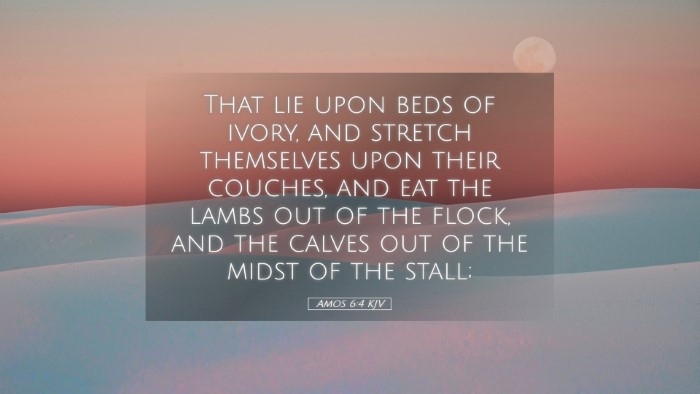Old Testament
Genesis Exodus Leviticus Numbers Deuteronomy Joshua Judges Ruth 1 Samuel 2 Samuel 1 Kings 2 Kings 1 Chronicles 2 Chronicles Ezra Nehemiah Esther Job Psalms Proverbs Ecclesiastes Song of Solomon Isaiah Jeremiah Lamentations Ezekiel Daniel Hosea Joel Amos Obadiah Jonah Micah Nahum Habakkuk Zephaniah Haggai Zechariah MalachiAmos 6:4
Amos 6:4 KJV
That lie upon beds of ivory, and stretch themselves upon their couches, and eat the lambs out of the flock, and the calves out of the midst of the stall;
Amos 6:4 Bible Commentary
Commentary on Amos 6:4
Amos 6:4 states: "Woe to those who are at ease in Zion, and to those who feel secure on the mountain of Samaria, the notable people in the first of the nations, to whom the house of Israel comes!"
This verse serves as a powerful caution against complacency and false security, especially among those who consider themselves righteous and part of God's chosen people. In examining the commentaries, we can glean profound insights into its meaning and implications.
Contextual Overview
Amos, a shepherd-prophet from Tekoa, delivered messages of judgment against the northern kingdom of Israel, specifically aimed at the elite and privileged who indulged in self-serving opulence while neglecting the true worship of God and the welfare of others. The broader context of Amos 6 highlights the spiritual decline and moral decay during a time of apparent prosperity.
Matthew Henry's Insights
The renowned commentator Matthew Henry highlights the spiritual lethargy of the people in Zion, emphasizing their complacency amidst relative peace and prosperity. He writes:
"They who live securely and at ease, while all around them is in a dangerous condition, are in a most alarming state."
Henry points out that the leaders and the rich in Samaria took comfort in their position, neglecting responsibility for the moral and spiritual condition of the nation. Their sense of security, he argues, is a delusion that blinds them to the impending judgment that is to come.
Albert Barnes' Commentary
Albert Barnes expands upon the themes of pride and self-reliance among the Israelites. He observes that:
"The rich and powerful ones of the nation were absorbed in luxury, oblivious to the calamities coming upon them..."
According to Barnes, the "mountain of Samaria" symbolizes not just physical stability but also the foundational trust that the people placed in their wealth and status. He urges the readers to scrutinize their reliance on earthly security, warning that it can lead to spiritual apathy.
Adam Clarke's Exegesis
Adam Clarke provides a historical lens in his commentary, noting that the expressions used in this verse illustrate the complete disregard for the harsh realities faced by the poorer classes and the prophetic warnings.
"These are the people who feast on the luxuries of life, unmindful of the labor and toil of those beneath them, thus incurring divine displeasure."
Clarke argues that true security is found in a life aligned with God’s commands and in care for one’s neighbor, contrasting the complacent attitude in Israel with the urgent call for justice and mercy emphasized throughout the prophetic literature.
Theological Reflections
The theological implications of Amos 6:4 are far-reaching. The verse challenges readers to reflect on their own lives and communities regarding complacency, wealth, and social responsibility.
-
Complacency in Faith:
The call to "woe" raises the urgent question of how modern Christians might be lulled into a false sense of spiritual security, much like the Israelites of Amos' time.
-
Socioeconomic Responsibility:
The connection between wealth and moral obligation suggests that believers are called to action, to advocate for justice, and to be aware of societal inequalities.
-
Proclaiming True Security:
True security is not found in earthly possessions or status but in steadfast faith in God who calls His people to a life of holiness and service.
Practical Applications
For pastors, students, theologians, and Bible scholars, the reflection on Amos 6:4 can lead to several practical applications:
-
Encourage Self-Examination:
Church leaders are encouraged to foster environments where congregations regularly engage in self-reflection regarding their spiritual lives and their responses to societal issues.
-
Promote Social Awareness:
Developing ministries that serve the marginalized can help counter the tendencies of complacency illustrated in Amos.
-
Teach about True Security in God:
Preaching that emphasizes reliance on God rather than worldly assurance can transform community perspectives and enrich faith practices.
Conclusion
Amos 6:4 serves as a profound reminder of the dangers of complacency and the need for vigilance in faith. The commentaries compel us to reflect on how we, too, might become complacent amidst prosperity and to take seriously the call to live righteously in a world that often prioritizes comfort over justice. In doing so, we uphold the values of the kingdom of God, serving Him and our neighbors with unwavering faith and a commitment to social justice.


